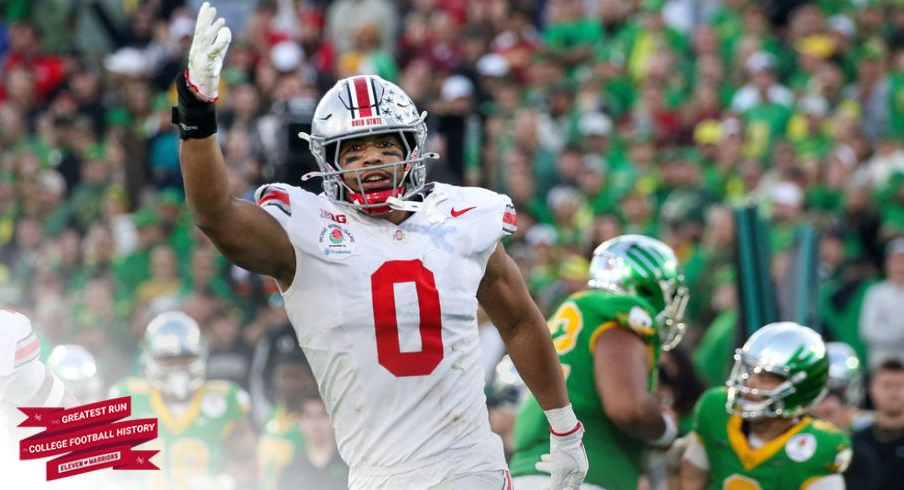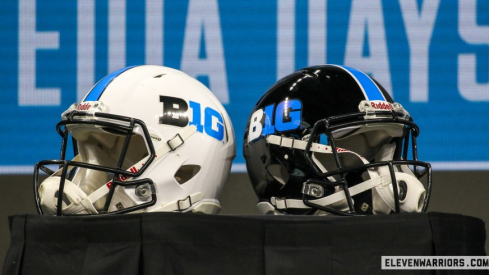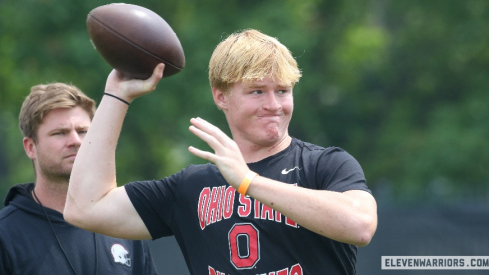Data often provides a reference point, but it can rarely tell the full tale.
The impact of the College Football Playoff on the draft stocks of Ohio State’s players last year cannot be measured. For most, it was undeniably positive, with incredible performances en route to a national championship likely to attract the attention of professional teams’ scouts. But there’s a plethora of incalculable factors that go into determining where a player gets drafted, including the pre-draft process after the CFP.
That said, examining the big-board projections of where Buckeyes stood entering the CFP compared to where they were ultimately drafted can show who some of the biggest NFL draft risers were during the playoffs. Using data from NFL Mock Draft Database, we’re looking at how 13 of Ohio State’s 14 draft picks improved or hurt their draft stock during the team’s postseason run.
One of Ohio State’s four first-round selections in the 2025 NFL draft, Josh Simmons, missed the CFP alongside the last six games of the regular season with a season-ending knee injury and is thus excluded from this list.
Biggest Risers
Cody Simon
Pre-CFP Projection: Undrafted
Drafted: Fourth round, No. 115 overall (Arizona)
On Nov. 21, with two regular-season games left in Ohio State’s season, Simon was No. 800 on the mock draft database’s consensus big board. As arguably the defensive MVP of Ohio State’s CFP gauntlet, it makes sense that the Arizona Cardinals saw fit to shave almost 700 from that number and draft Simon in the fourth round.
Simon was named defensive MVP of both the Rose Bowl and CFP national championship game, the centerpiece of the Buckeyes’ defense with a team-high 38 tackles with four tackles for loss, two sacks and two pass breakups.
Your National Championship Defensive MVP: Cody Simon pic.twitter.com/tiEnjJ7NXW
— FOX College Football (@CFBONFOX) January 21, 2025
Lathan Ransom
Pre-CFP Projection: Undrafted
Drafted: Fourth round, No. 122 overall (Carolina)
Unlike Simon, Ransom was at least viewed as a fringe draft candidate per the consensus big board, but the CFP showcased his incredible blend of traditional hard-hitting strong safety prowess and excellent coverage skills. He collected 19 tackles with three tackles for loss, a sack and a PBU.
TreVeyon Henderson
Pre-CFP Projection: Late third round
Drafted: Second round, No. 38 overall (New England)
Henderson turned heads with his explosive plays in the CFP, a 75-yard screen pass touchdown in the waning seconds of the first half against Texas in the semifinals and a 66-yard dash against Oregon in the Rose Bowl being the most notable. But his proficiency in pass protection boosted his stock in a deep running back draft class as much as anything.
“I thought Henderson at Ohio State might've been as good a pass-protection back as I've seen come out of college,” Indianapolis Colts general manager Chris Ballard remarked after the draft despite the fact that the Colts didn’t draft Henderson. “But most of them, they're just not asked to do it at the level we are asking our guys to do it, especially with the size of the men they have to block that are coming at them.”
Quinshon Judkins
Pre-CFP Projection: Early third round
Drafted: Second round, No. 36 overall (Cleveland)
Judkins collected 255 rushing yards and six touchdowns at a clip of 5.4 yards per carry in the CFP, flexing a bit more pass-catching prowess with seven receptions for 52 yards and a score. It was further evidence that his physical running style could translate well to the NFL, and the Browns saw enough to keep him in-state as an early second-round selection. He was quietly one of Ohio State’s best weapons against Notre Dame in the national championship game, collecting 100 rushing yards in just 11 carries with two touchdowns, adding a receiving touchdown for three total scores.
Quinshon Judkins in the National Championship
— Woody (@woodyVSworld) May 12, 2025
11 Carries
100 Yards (9.1 AVG)
3 Total TDs
pic.twitter.com/tQnrEcOaH1
Donovan Jackson
Pre-CFP Projection: Mid-second round
Drafted: First round, No. 24 overall (Minnesota)
It was a gamble for Jackson to switch from his stalwart guard position to left tackle midseason and fill a need for Ohio State following Simmons’ injury. His talent and determination dealt him pocket aces. He emerged as one of the best offensive tackles in the country despite never playing the position previously in college, allowing no sacks and just two total pressures, per PFF, against a gauntlet of the nation’s best edge rushers.
The Vikings drafted Jackson to play guard at the next level, but his play at tackle in the CFP made him a first-round pick.
Stock Held Firm
Emeka Egbuka
Pre-CFP Projection: Late first round
Drafted: First round, No. 19 overall (Tampa Bay)
A second 1,000-yard season and ownership of Ohio State’s career receptions record were both claimed by Egbuka in the CFP, but they also evidenced why his stock didn’t have much further to climb. The sixth and final first-round selection to come from the Buckeyes’ 2021 wide receiver room, his production and athletic profile had him as a first-round lock entering the playoffs. He did showcase some incredible contested-catch skills, however:
Emeka Egbuka with one of the greatest catches in Ohio State history Buckeyes on fire! pic.twitter.com/1hhtF0dNRa
— The Buckeye Show (@TheBuckGuys) May 18, 2025
Tyleik Williams
Pre-CFP Projection: Late first to early second round
Drafted: First round, No. 28 overall (Detroit)
A combined 99 tackles, 18 TFLs, 5.5 sacks and six PBUs across the last two seasons from the 330-pound Williams gave him the production necessary to be a first-rounder, and he did nothing to dispel that status in the CFP with 14 tackles and 2.5 TFLs. Ohio State’s four postseason opponents averaged a pathetic 2 yards per carry as Williams and Ty Hamilton plugged the middle for the Buckeyes at defensive tackle.
Will Howard
Pre-CFP Projection: Sixth round
Drafted: Sixth round, No. 185 overall (Pittsburgh)
The CFP showed why Howard’s sixth-round projections could be underselling his skillset, as he proved he was the right quarterback to guide Ohio State to a national title. Howard’s gaudy four-game statline finished with a 75.2% completion rate, 1,150 yards and eight touchdowns against two interceptions.
JT Tuimoloau
Pre-CFP Projection: Early to mid-second round
Drafted: Second round, No. 45 overall (Indianapolis)
Despite an eye-popping CFP run with 23 tackles, 10 TFLs and 6.5 sacks, Tuimoloau’s NFL draft stock remained stagnant, at least going off of what was projected from the experts.
Ty Hamilton
Pre-CFP Projection: Late fourth to early fifth round
Drafted: Fifth round, No. 148 overall (Los Angeles Rams)
Hamilton remained the stalwart, unheralded, block-eating, run-plugging nose guard necessary to any good defense for Ohio State in the CFP. His fifth-round selection to the Rams made it four defensive linemen drafted from one Buckeye squad for the first time in team history.
Taken Lower Than Pre-CFP Projections
Jack Sawyer
Pre-CFP Projection: Second round
Drafted: Fourth round, 123rd overall (Pittsburgh)
This section of three players was originally called “stock declined,” but it’s impossible to say, in good faith, that Sawyer’s draft stock declined in the CFP. His fall from projected mid-day two pick to day three likely had everything to do with his pre-draft workouts and concerns about his arm length. It certainly didn’t pertain to his 13 tackles, 4.5 sacks and seven PBUs in the CFP. Here’s a replay of one of those sacks that you’ll surely enjoy watching for roughly the 10,000th time:
JACK SAWYER SCOOP-AND-SCORE
— ESPN (@espn) January 11, 2025
Ohio State is one step closer to advancing to the national championship! pic.twitter.com/BPoV5FBRGZ
Jordan Hancock
Pre-CFP Projection: Fourth round
Drafted: Fifth round, No. 170 overall (Buffalo)
Hancock was one of the biggest unsung heroes of Ohio State’s CFP run, allowing a measly 6.1 yards per target while rolling between his usual nickel spot and deep safety duties to enable the best defense of safety Caleb Downs. He also had arguably the best Pro Day testing of any Buckeye, with a 4.42-second 40-yard dash, 41.5-inch vertical leap and 10-foot-6 broad jump. The Bills might have simply gotten a steal here.
Denzel Burke
Pre-CFP Projection: Third round
Drafted: 174th overall
Burke’s stock was one of the few that fell from its 2024 standing after he joined the wave of seniors who returned for last season’s redemption quest. An injury led him to be subbed out in the second half against Texas, but his coverage statistics in the playoffs were fantastic. Targeted 10 times across the four games, he allowed just four receptions for 43 yards and no touchdowns. That’s 4.3 yards per target. The worst passing offense in college football last season, New Mexico State, averaged 5.4 yards per pass attempt.



